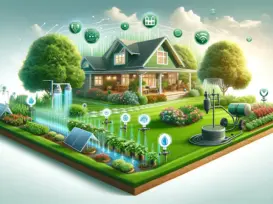Grus Home Energy - Smart irrigation
Transforming Agriculture with Smart Irrigation Technology
Smart irrigation technology is revolutionizing the way farmers manage water resources and improve crop yields. By utilizing sensors, weather data, and automation, farmers can precisely monitor and control water usage, leading to significant water savings and increased efficiency.
One of the key components of smart irrigation systems is the use of soil moisture sensors. These sensors are strategically placed in the field to measure the moisture levels in the soil. By collecting real-time data, farmers can determine when and how much water to apply to their crops, ensuring that the plants receive the optimal amount of water for growth.
Weather data is another crucial aspect of smart irrigation technology. By integrating weather forecasts into the irrigation system, farmers can adjust their watering schedules based on upcoming weather conditions. For example, if rain is predicted, the system can automatically delay watering to avoid over-watering the crops.
Automation plays a significant role in smart irrigation systems by allowing farmers to remotely monitor and control their irrigation systems. Through a smartphone or computer, farmers can access their irrigation system and make adjustments as needed. This not only saves time and labor but also ensures that the crops are receiving the right amount of water at the right time.
One of the main benefits of smart irrigation technology is water conservation. By using sensors and data-driven decision-making, farmers can reduce water waste and minimize water usage. This is particularly important in regions facing water scarcity or drought conditions, where every drop of water counts.
In addition to water savings, smart irrigation technology can also improve crop yields and quality. By providing crops with the right amount of water, nutrients, and sunlight, farmers can optimize plant growth and productivity. This can lead to higher yields, better quality crops, and ultimately, increased profits for farmers.
Overall, smart irrigation technology is transforming agriculture by making water management more efficient, sustainable, and environmentally friendly. By harnessing the power of sensors, weather data, and automation, farmers can improve their irrigation practices, conserve water, and boost crop production. As the demand for food continues to rise, smart irrigation technology will play a crucial role in ensuring a secure and sustainable food supply for future generations.
©2025 All Rights Reserved. Grus IoT Co.,Ltd.
